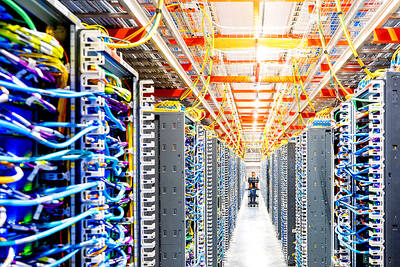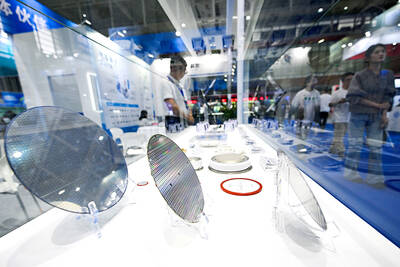Booming sales of new cars in central and eastern Europe have raised the possibility that buyers may be turning their backs on second-hand dealerships, the traditional route to automobile ownership.
New car registrations jumped 14.5 percent in the EU’s 10 new post-communist members in the first quarter compared with the same period last year.
At the same time, there was a 2.9 percent drop in the West, said the European auto manufacturers’ grouping ACEA.
But there were few celebrations at the Prague headquarters of AAA Auto, Central Europe’s biggest second-hand car company and the only European used car dealership listed on the stock exchange.
Investors who bought into its launch on the Prague and Budapest stock markets in September have seen share values more than halve following an end-of-the-year sales slump that has continued into this year.
The company announced a 4.9 million euro (US$7.7 million) profit for last year after 14.2 million euros in 2006.
“From October to November sales dropped by 16 [percent to] 18 percent. When you take into account the new showrooms that we opened the real fall was more in the order of 20 percent,” said Anthony Denny, a Sydney-born Australian who launched the business after coming to Prague in 1992 from Los Angeles where he had dealt in vintage cars.
“All our three core markets were affected, the Czech Republic, Slovakia and Hungary,” he said.
A hike in oil prices meant lower and lower-middle class buyers postponed purchases, the 45-year-old said.
At the same time some of central Europe’s upwardly mobile buyers have discarded the traditional first step to car ownership — buying second-hand — and have “leapfrogged straight into the new car market.”
Denny insists the slump is temporary. But the roll-out of ambitious international expansion plans, funded from the 32 million euros raised by the share placement, have been stalled, jobs cut and the number of new showroom openings reduced to fewer than six from the planned 15.
And some analysts fear the downturn has further to run.
Petr Hlinomaz of the brokerage BH Securities argued that “stricter environmental rules” could induce buyers to opt for new rather than used cars.
A survey for General Electric’s Czech car loans business this month revealed mixed signals.
Sixty-five percent of Poles and 61 percent of Czechs in the market said that they were thinking of a second-hand car while 50 percent of Hungarians and 56 percent of Romanians wanted a new one.
The good news for both camps is that there is pent-up demand for cars, with 76 percent of Polish, 68 percent of Czech, 57 percent of Hungarian autos on the road more than seven years old.
AAA Auto’s eastward and southward expansion into Russia, Ukraine and Serbia is continuing but the pace of activity will be slow until late next year, 2010 and some time after 2011 respectively, Denny said.
The company has a toehold in Poland and Romania but still relies heavily on the Czech Republic and Slovakia.
Two factors in the company’s sales pitch are its sophisticated buying and selling networks aimed at sourcing cars at the best prices and selling them fast at a premium.
Within the Czech Republic, it buys many cars in north Bohemia to sell in the east and southeast of the country where they are in short supply.
“Buying and selling used cars is not about selling, it is really about buying,” Denny said.
Customer tastes also vary, with the “fussy Hungarians” seduced by nice wheels and silver or black paintwork while Poles just look at the price tag, he said.
Cars sales on their own make little profit.
“The ‘metal’ represents about 12 percent of profit,” said Denny, adding that financial services such as loans, insurance and sales of accessories are the real earners.
For the future, AAA has an eye on straddling the used and new car market by grabbing the opportunities that imports of cheap new Chinese cars could offer.

AI SPLURGE: The four major US tech companies have lost more than US$950 billion in value since releasing earnings and outlooks, while equipment makers were gaining Four of the biggest US technology companies together have forecast capital expenditures that would reach about US$650 billion this year — a flood of cash earmarked for new data centers and all the gear within them. The spending planned by Alphabet Inc, Amazon.com Inc, Meta Platforms Inc and Microsoft Corp, all in pursuit of dominance in the still-nascent market for artificial intelligence (AI) tools, is a boom without a parallel this century. Each of the companies’ estimates for this year is expected either near or surpass their budgets for the past three years combined. They would set a high-watermark for capital spending

China’s top chipmaker has warned that breakaway spending on artificial intelligence (AI) chips is bringing forward years of future demand, raising the risk that some data centers could sit idle. “Companies would love to build 10 years’ worth of data center capacity within one or two years,” Semiconductor Manufacturing International Corp (SMIC, 中芯) cochief executive officer Zhao Haijun (趙海軍) said yesterday on a call with analysts. “As for what exactly these data centers will do, that hasn’t been fully thought through.” Moody’s Ratings projects that AI-related infrastructure investment would exceed US$3 trillion over the next five years, as developers pour eye-watering sums

Bank of America Corp nearly doubled its forecast for the nation’s economic growth this year, adding to a slew of upgrades even after a rip-roaring last year propelled by demand for artificial intelligence (AI). The firm lifted its projection to 8 percent from 4.5 percent on “relentless global demand” for the hardware that Taiwanese companies make, according to a note dated yesterday by analysts including Xiaoqing Pi (皮曉青). Taiwan’s GDP expanded 8.63 percent last year, the fastest pace since 2010. The increase “reflects our sustained optimism over Taiwan’s technology driven expansion and is reinforced by several recent developments,” including a more stable currency,

COLLABORATION: Taiwan and the US could jointly find solutions to weaknesses in supply chain resilience for critical materials, focusing on mining and initial refinement Taiwan is likely to purchase rare earths from the US in the future, and is also in talks with Australia and Canada to strengthen global rare earth supply chain security, Minister of Economic Affairs Kung Ming-hsin (龔明鑫) said yesterday. Taiwan and the US last month concluded the sixth Economic Prosperity Partnership Dialogue, during which both sides signed a joint statement endorsing the principles of the Pax Silica Declaration, pledging to deepen cooperation in areas including critical minerals. At the time, Kung said the two sides would establish working groups to advance cooperation in areas including artificial intelligence, digital infrastructure, critical materials and